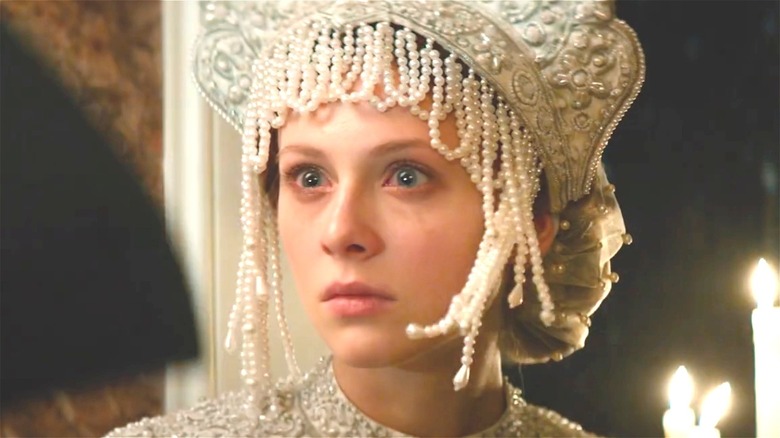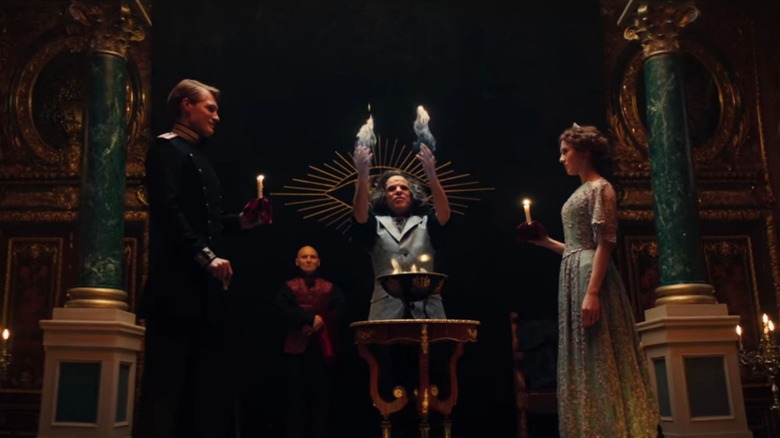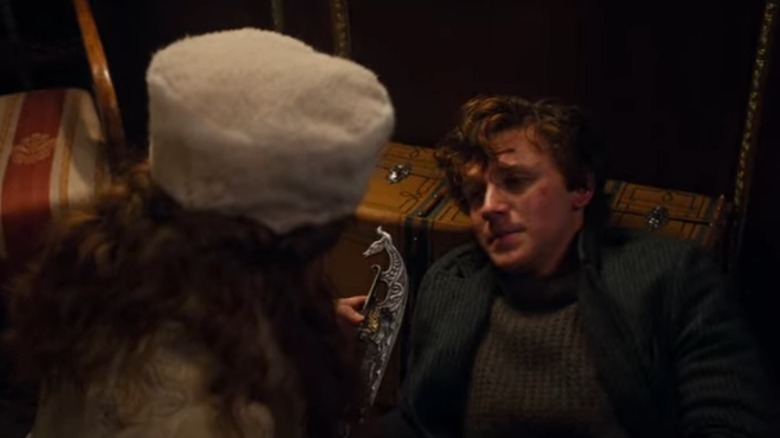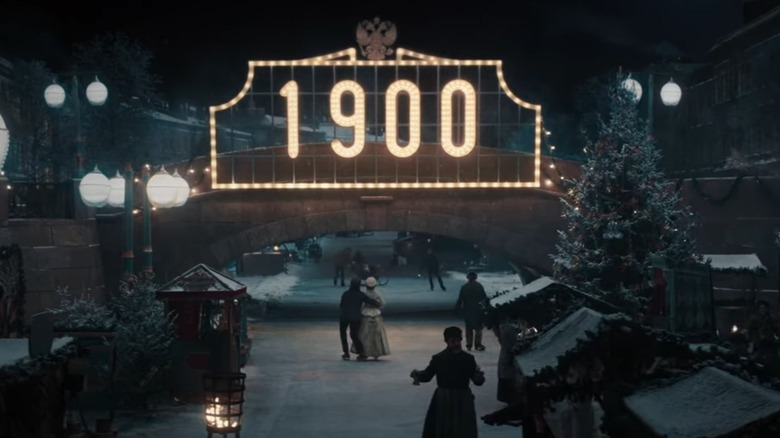The Ending Of Silver Skates Explained
Set in snowy St. Petersburg at the end of the 19th century, "Silver Skates" is the first-ever Netflix Original to hail from Russia. The film is a lush period piece with a "Romeo and Juliet" style romance at its center that sees headstrong aristocrat Alice (Sofya Priss) falling for petty thief Matvey (Fedor Fedotov). Of course, in Imperial Russia, their romance faces opposition from just about every direction.
Thankfully for Alice and Matvey, though, they are both young, resourceful, and passionate enough to leap over the hurdles placed before them by society. Alice has a voracious appetite for knowledge, with a special interest in chemistry, and detests the fact that women aren't allowed to pursue higher education in Russia. Matvey is a skilled ice skater and with a strong desire for economic justice in a society marked by immense inequality. After crossing paths several times, the pair can't help but give in to the obvious attraction that keeps pulling them together. However, both Alice's aristocratic family and Matvey's revolutionary friends don't approve of the relationship.
After navigating an arranged engagement to a well-respected police captain named Arkady (Kirill Zaytsev) and several run-ins with his officers, Alice and Matvey realize that the only way for them to be together is to flee Russia for Paris. The film's thrilling finale sees them making a daring getaway on a night train while being pursued by an enraged Arkady.
But leading up to that grand climax, the film gives lots of rich subtext to their clandestine romance. Let's unpack it all and take a deeper look at the ending of "Silver Skates."
Alice is bound by more than just tradition
One of the key themes of Alice's part of the story in "Silver Skates" is the friction between science and mysticism. Alice yearns to get a university education and yet she is prevented from doing so. It's not her own lack of intelligence or ambition that stops her, but rather the arcane misogynist beliefs of those around her.
Literal mysticism is seen throughout the film, largely thanks to Alice's stepmother Severina (Severija Janusauskaite), who hosts parties featuring astrology readings and magicians. During one particularly emblematic moment, a mystic hired by Severina holds a demonstration that he says will show whether or not Alice and Arkady are meant to be together. He instructs them to use candles to light a fire in a bowl and says that if he's able to stick his hands in the fire without being burnt, it will mean the match is destiny. The mystic does so, much to the dismay of the assembled crowd. However, Alice's knowledge of chemistry helps her see through the ruse. She knows he's using scientific techniques to make the impressionable audience believe the story he's telling them. The idea that she and Arkady are meant to be together is a similarly constructed fraud.
To take the metaphor a step further, we could also say that the aristocratic world Alice is from is propped up by a series of mystic beliefs, namely that some people are inherently deserving of their wealth, while others are meant to be poor. Matvey demonstrates this for her early in their courtship by asking her how her family came to live in such a large mansion. Alice defiantly declares that it was built by her grandfather. But Matvey follows up by noting that it was her grandfather's slaves who literally did the work to build the mansion, a detail that is clearly glossed over in the mythical version of the story Alice has no doubt heard her entire life. In deciding to leave Russia for Paris, she is closing that particular book of fairy tales.
Matvey learns to have faith
If Alice's world is fenced in by arcane mysticism, Matvey's is similarly afflicted by cynicism. He and his friends steal from the rich without a second thought because they believe it is justice for how the rich have stolen from the working people. The film isn't unsympathetic to those ideas, but it also questions what purpose that kind of black-and-white logic serves. When Matvey's father Pyotr (Timofey Tribuntsev) learns that his son is a professional thief, he scolds Matvey, even when he learns that Matvey is doing it to try and cure his tuberculosis.
"Nothing good will ever come of money gained in a dishonest way," Pyotr tells his son. He instructs Matvey to give the money back, saying, "I know you want to save my life, but I want to save your soul."
In that scene, Matvey expresses doubt about the existence of God, which enrages his father. This theme of faith is touched on in the film's climax. As Matvey rushes to get on the Paris-bound train that will take him and Alice to freedom, he's shot in the chest by Arkady. However, the bullet is stopped by his silver skates, which are hanging underneath his coat. The skates were given to him by his father, who believed they had special properties, and after surviving the shooting, even Matvey declares, "These skates are ... magical."
This miraculous turn doesn't suggest that Matvey should adhere to Pyotr's insistence on fealty to a strict order based on religious morals, but it does imply that it wouldn't hurt him to have a bit more faith in something beyond his own ideas.
The dawning of the 20th Century
While Alice and Matvey's romance takes center stage in "Silver Skates," the arrival of the 20th century is the backdrop for the action. Most of the movie takes place in the final days of 1899 and characters frequently make reference to the fact that a new century is fast approaching.
Many of the conflicts faced by Alice and Matvey are rooted in the growing pains of a rapidly modernizing world. We get a taste of how quickly and how much things do change in the film's epilogue, which takes place several years after Alice and Matvey escape to Paris on New Year's Eve 1899. Alice is not only a promising chemistry professor, but her father has also helped change the laws in Russia so that she can teach in her home country. When she returns, she does so married to Matvey, a union that was unimaginable only a few years prior.
Although the film doesn't reference this, there is even more change on the horizon courtesy of the Bolshevik Revolution and subsequent Russian Civil War, which will see the end of the Russian aristocracy and the birth of the communist USSR (via History).
How Alice and Matvey's love fares in that particular storm isn't addressed. "Silver Skates" seems much more interested in exploring a single moment in time, rather than the long-term effects of the actions of its narrative. It's about the first sparks of young love, the decisions that change one's life forever, and the feeling of looking out at the world and realizing it will never again be the way it was yesterday. The future may be uncertain for Alice and Matvey, but they'll never lose that magical New Year's Eve when a pair of silver skates helped change their destiny forever.



